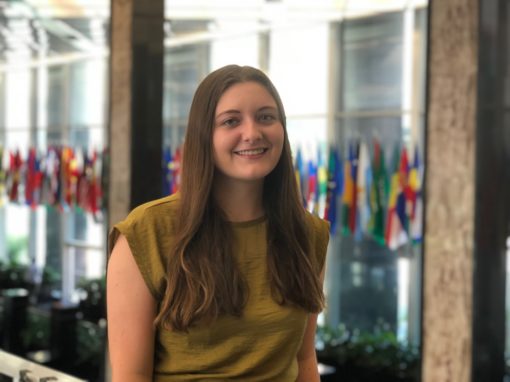Changemaker Catalyst Award recipient Kayden McKenzie traveled to Washington D.C. this past summer to intern at the U.S. Department of State in the Bureau of Democracy, Human Rights, and Labor, where she learned about the human rights impacts of business and technology. McKenzie is majoring in Political Science and Philosophy with a minor in History.

When my office told me that I would be covering internet freedom and business and human rights, my first thought was, “What does that mean?” Little did I know, I would be doing significant work in a growing field relevant to all people, not just across the nation, but around the world.
Internet freedom is essentially the idea that human rights, such as the freedoms of expression and association, apply online just as they would in person. The State Department’s approach to advance internet freedom around the world is through funding programs that respond to internet repression. Internet freedom, along with business and human rights, relies on multi-stakeholder engagement – essentially, the government engaging in dialogue with industry and civil society to advance human rights. Business and human rights is the idea that businesses should respect human rights in their operations.
With the increasing role of businesses like Apple and Amazon in our everyday lives, as well as our growing reliance on the Internet for nearly everything, I believe that internet freedom and business and human rights are important to pay attention to. This field is particularly fascinating to me because I never considered the human rights impacts of companies before this internship.
In terms of the internship itself, it was my first real 9-to-5 office job. My responsibilities during these eight hours varied from researching and drafting documents on my computer to leaving the office to attend meetings and events throughout Washington DC that intrigued me. I was surprised and pleased that as an intern, I had a level of flexibility that enabled me to pursue my own interests, while also doing work that the office needed. I think this approach allowed me to take full advantage of being in DC because I learned about various topics that I did not necessarily cover at work and met people who worked in different fields.

Back at Tulane, I plan to continue educating myself on issues related to internet freedom and business and human rights. As Co-President of Tulane’s Amnesty International chapter, I also hope to bring my new knowledge about human rights to this position to have a positive impact on both the Tulane and New Orleans community.
